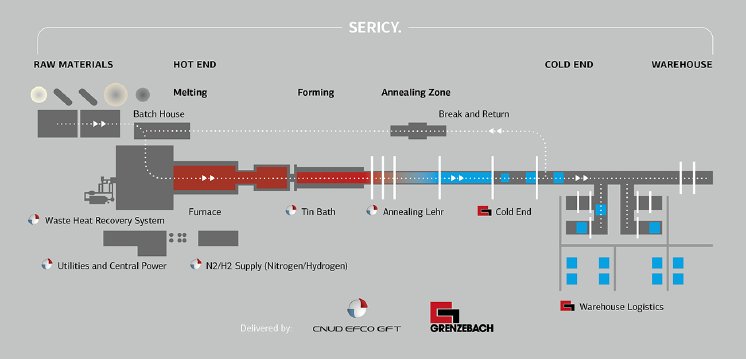Two leading providers for flat glass production technology unite their strengths: The Grenzebach Group with its headquarters in Hamlar near Augsburg acquired CNUD EFCO GFT, the business unit float and container glass of the BMT Group. "In the past, we frequently built our Cold End following the tin bath and annealing lehr from CNUD and one could clearly tell that both companies stand for high-tech and quality", says Egbert Wenninger, Senior Vice President Business Unit Glass at Grenzebach.
Integrated solutions for customers world-wide
World-wide there are over 300 flat glass production lines with Grenzebach Cold End equipment. CNUD EFCO GFT offers solutions for annealing lehrs, tin baths and accessory machinery, has a great reputation and a leading position within the market and contributed to the installation of 300 production lines. CNUD EFCO GFT has several international locations in Belgium, Germany, Romania and China - and going forward will also profit from the Grenzebach locations in China in the USA. "Together with integrated solutions we are a unique partner for our customers world-wide", says Dennis Schattauer, Managing Director of the GFT GmbH. He continues: "The daily exchange within the Grenzebach Group with automation and digitalization experts is readily available to us. This will push our team even more." With a common strategy glass production technology will further be optimized and automated.
Higher quality, more sustainability
One-cast solutions for increasingly complex float glass production lines, joint technological improvements and new developments, creation of additional values with innovation for the digital glass industry and a focus on energy efficiency: The close cooperation between Grenzebach and CNUD EFCO GFT will bring advantages to customers for product quality, economic efficiency and sustainability. Integrated control system and inspection technology can be realized with know-know collected from several decades. CNUD EFCO GFT has extensive experience in the thermal processes of glass lines - upstream the Cold End where the quality of the glass ribbon and therefore the customer’s profit is decided.
Data record of the complete production line
These empirical values and the process knowledge from CNUD EFCO GFT are combined with data resulting from Grenzebach’s inspection solutions. With SERICY, the digitization platform developed by Grenzebach, future data can be collected on the complete float glass production line and be available for optimizations at the glass manufacturers - up to detailed recommendations for equipment operators as well as solid indications for the quality manager. Example #1: The sheet thickness is measured at the beginning of the annealing lehr in order to be able to react early on should production neglect the admissible thickness tolerance range. Example #2: At the Cold End Grenzebach measures the glass ribbon tension profile, i.e. the tensions within the glass along a measuring line across the glass ribbon, which is created during the cool down process. With Grenzebach’s IIoT platform SERICY it is possible to directly adapt the annealing lehr settings to achieve the optimum tension curve. With this integrated approach significant improvements can be realized. "In the future, we are able to detect, analyze and achieve all relevant production parameters of a campaign or even a single sheet along the complete line for subsequent follow-up", says Wenninger.
Consistent control system, optimized usability
For the tin bath and the annealing lehr in the forming area, as well as for the cold end, a consistent control system with less interfaces and improved usability will be possible. These examples show the increased potential of cooperation in terms of digitalization. The digitization of flat glass production lines is one of the innovative drivers within the glass industry.
All from one source - transport included
From the tin bath to the annealing lehr to the Cold End and the transport of the final product to the warehouse, Grenzebach is now able to offer the complete equipment. Synergies derived from design, common development and planning from the integrated production lines allow for smooth realization of projects with a clearly reduced coordination effort for the glass manufacturers.
Improvement of energy efficiency
Reduction of the energy consumption and the output of emissions, such as CO2 are fundamental challenges for the glass industry to achieve climate targets and to receive future operating permits. The experts from Grenzebach and CNUD EFCO GFT work together to build improved heat recycling systems for flat glass equipment. "The improvement of energy efficiency of flat glass production technology is an important item on our joint agenda", says Dennis Schattauer. Last but not least, we are able to prove that it is possible to significantly reduce energy consumption and the CO2 emissions with digital means.



